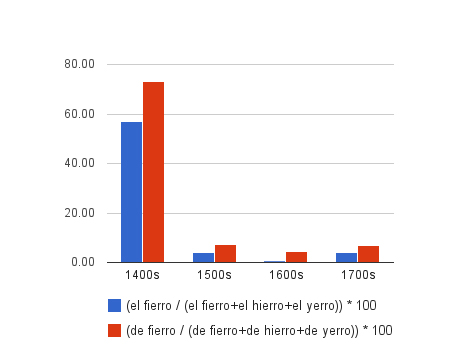Last night, making the seamstress’s leftover-veg curry, I was chatting idly, as one does, to someone about the modern sociolinguistics of fierro vs hierro–these coexist in interesting fashion in Latin America and occasionally in less developed parts of Spain, where fierro may be the iron of choice of the poor and illiterate.
I then dug around a bit while waiting for the potatoes and found a rather nice 16th century example of role reversal, the servants using hierro while their masters say fierro, and I’ll post something about that some other time.
But for now I thought I’d share another serendipity. Correas says somewhere that h/f are interchangeable, so as fierro gives way over time to hierro you’d expect roughly equal usage for both forms after de and el. But the data from the Corpus del Español suggest a mild preference for the consonant before hierro/yerro, presumably to avoid phonetic clumsiness (el agua, etc etc). In administrative documents I think usage is fairly indifferent, but Luis de León’s dramatic take on Job 20 surely wouldn’t work any other way:
Del hierro huirá triste, afligido
dará sobrel acero, de un liviano
peligro dará en otro más crecido.
Con la espada desnuda en alta mano,
con el amargo fierro relumbrante
le seguirá terrible el soberano.
With such nonsense (and wondering how much less we’ll be worth by Monday) we pass this Friday lunchtime.
[
The numbers:
]
Similar posts
Back soon


Doesn’t help that the periodic table has iron down as “Fe”, I suppose, although I don’t suppose you can link that to the 1400’s.
Of course, that rock off Africa was known as Ferro for centuries until linguists from Madrid redrew the maps and corrected the peasents. Says here that Agustín Torres, in his seminal work on the Canary Islands, reckons the name evolved from a previous name of Ecerós (which meant strong as Iron), although he then admits he more or less made up the anecdote to fill up a few pages.
Sorry, what were we talking about again? Friday pm boredom, I’m afraid!
Old forms often are conserved in remote places, because there is a disconnection from the development of the language at its place of origin. At the same time, new forms are introduced in those remote places that do not find their way back home for the same reason.
Something different happens between master and servant in your example: the master is supposed to be more educated than the servant, which in many cases means he is more conservative with cultural traditions.
As to hierro v yerro, the pronunciation is the same and “y” is the correct representation of the phoneme in question. However, “(h)i” has been conserved in writing, maybe because of conservatism, maybe to set the metal apart from the “yerro” of “errar”.
I’ve always wondered why the f > h worked some words not others. There’s no reason why “fierro” should change when “fiel” stayed the same.
I think fel > hiel (= bile) happened first. Systems are Ok to a certain point.
Fierro (which, btw is still accepted by the RAE) is of course the older word. There is a theory that many of the “ancient” latinisms starting with an “f” became corrupted to “hi” or “he” because of the Basque influence (Basque had no f phoneme). Also, the Spanish couldn’t pronounce “mr”, so they started to stick a “b” in there (famre became hambre, etc). Another example: hembra (from the latin femina) or hambre (from famen). Both fierro and femina are still valid words in South America, where the Basque influence wasn’t felt as much. The 18th century development of the RAE meant a lot of these “new” terms were codified, for Spain, but since shortly afterwards (well, 80 years or so) all the colonies broke loose, they felt no need to adhere to the new fancy written Castellano of Madrid.
Unlike the English mishmash, where we have iron from Celtic and ferrous from Latin. (Thank you William the bastard for your civilising influence!)
Ralph Penny says that Menéndez Pidal idea about a Basque substratum seems unlikely since the same change happens where no Basques are to be found. He’s in favour of (high-status) French newcomers in the 12th and 13th centuries using a sound they knew in preference to one they didn’t, that change being adopted by their Spanish associates, while (low-status) Iberians kept on using h-